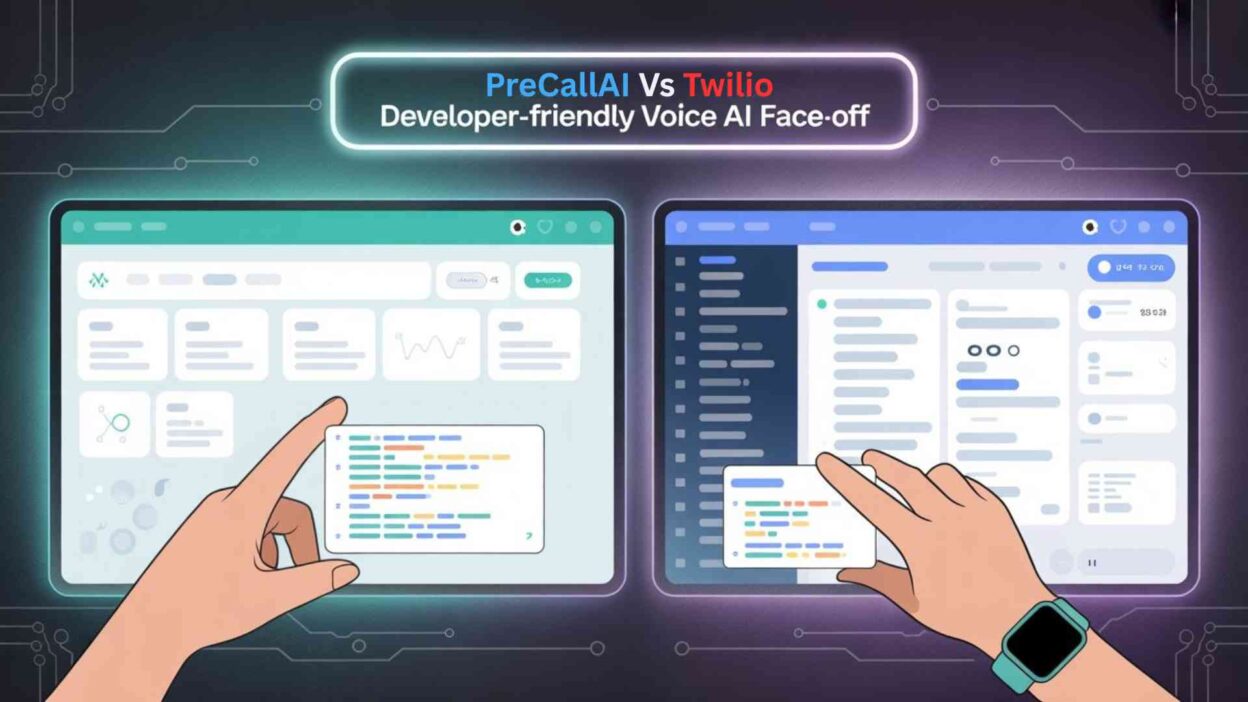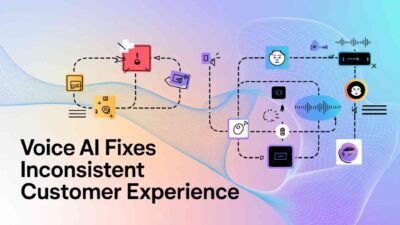TL;DR PreCallAI vs Twilio represents the ultimate battle for developer voice AI supremacy. Both platforms offer powerful voice automation solutions. Developers must select the appropriate platform for their specific projects.
Table of Contents
Voice AI technology transforms how businesses handle customer communications. Each platform brings unique strengths to development teams. The choice has a significant impact on project timelines and budget requirements.
PreCallAI vs Twilio: Platform Overview
PreCallAI‘s Features
PreCallAI specializes in AI-powered voice calling solutions. The platform focuses on conversational AI capabilities. Developers get pre-built voice agents for common use cases.
The system includes natural language processing features. Voice recognition accuracy reaches industry-leading levels. Integration takes minutes rather than weeks for basic implementations.
PreCallAI offers ready-to-use voice templates. These templates cover customer service scenarios effectively. Developers can customize templates for specific business needs.
Twilio Voice Platform Capabilities
Twilio provides comprehensive communication APIs for developers. The platform supports voice calls, messaging, and video features. Twilio offers maximum flexibility for custom implementations.
Developer voice AI solutions require extensive coding with Twilio. The platform provides building blocks rather than complete solutions. Custom development takes significantly more time and resources.
Twilio supports multiple programming languages seamlessly. Developers can use Python, JavaScript, PHP, and other languages. The documentation includes extensive code examples and tutorials.
Developer Experience Comparison
Setup and Integration Process
PreCallAI simplifies the initial setup process dramatically. Developers can deploy basic voice agents within hours. The platform provides intuitive dashboard interfaces for configuration.
API integration requires minimal coding knowledge. Pre-built connectors work with popular CRM systems. Developers spend less time on infrastructure setup.
Twilio requires more extensive setup procedures. Developers need to configure multiple services manually. The flexibility comes with increased complexity requirements.
Learning Curve and Documentation
PreCallAI offers streamlined documentation focused on voice AI. Tutorials cover common implementation scenarios quickly. New developers can become productive within days.
The platform includes visual workflow builders. These tools reduce coding requirements significantly. Developer voice AI projects launch faster with PreCallAI’s approach.
Twilio provides comprehensive documentation covering all features. The learning curve is steeper for voice AI implementations. Developers need weeks to master the platform fully.
Advanced developers appreciate Twilio’s detailed technical documentation. The platform offers extensive customization possibilities. Complex projects benefit from Twilio’s flexibility and control.
Code Examples and Implementation
PreCallAI provides ready-to-use code snippets for common scenarios. JavaScript and Python examples cover most use cases. Developers can copy and modify existing implementations.
// PreCallAI simple integration example
const precallai = require(‘precallai-sdk’);
const voiceAgent = new precallai.VoiceAgent({
apiKey: ‘your-api-key’,
template: ‘customer-service’
});
Twilio requires more detailed coding for voice AI features. Developers build solutions from foundational components. Custom logic requires extensive programming knowledge.
Developer voice AI implementations with Twilio offer maximum control. Every aspect of the voice experience can be customized. This flexibility demands more development time and expertise.
Technical Capabilities Analysis
Voice Recognition and Processing
PreCallAI uses advanced speech recognition technology built-in. The system handles multiple languages and accents effectively. Voice processing happens automatically without developer intervention.
Conversation flow management is handled by the platform. Developers configure scenarios rather than programming complex logic. The AI manages natural conversation patterns intelligently.
Twilio requires developers to integrate third-party speech services. Google Speech-to-Text and Amazon Transcribe work with Twilio. Integration complexity increases with multiple service dependencies.
Customization and Flexibility
PreCallAI offers template-based customization approaches. Developers modify pre-built conversation flows easily. The platform balances simplicity with customization options.
Custom voice personalities can be configured through settings. Developers adjust tone, speed, and response patterns. Advanced AI training requires platform support assistance.
Twilio provides unlimited customization possibilities for experienced developers. Every voice interaction can be programmed precisely. Complex business logic integrates seamlessly with voice features.
PreCallAI vs Twilio customization differs fundamentally in approach. PreCallAI emphasizes ease of use over flexibility. Twilio prioritizes flexibility over simplicity.
Scalability and Performance
PreCallAI handles scaling automatically for most applications. The platform manages infrastructure requirements behind the scenes. Developers focus on business logic rather than system performance.
Call volume increases don’t require developer intervention. The system adjusts resources automatically during peak periods. Performance monitoring tools provide usage insights.
Twilio offers granular control over scaling parameters. Developers can optimize performance for specific use cases. Advanced scaling requires detailed technical knowledge and planning.
Global infrastructure ensures low latency worldwide. Multiple data centers provide redundancy and reliability. Enterprise applications benefit from Twilio’s robust infrastructure.
Pricing and Cost Considerations
PreCallAI Pricing Structure
PreCallAI uses straightforward per-minute pricing models. Developers can predict costs accurately for budget planning. No hidden fees or complex pricing tiers exist.
The platform includes AI processing in base pricing. Voice recognition and natural language processing cost nothing extra. This simplifies cost calculations for development teams.
Startup-friendly pricing makes PreCallAI accessible for small projects. Free tiers allow developers to test functionality extensively. Production deployments remain cost-effective for most applications.
Twilio Cost Analysis
Twilio charges separately for each service component used. Voice calls, speech recognition, and AI services have individual pricing. Total costs can be difficult to predict accurately.
Developer voice AI projects may require multiple Twilio services. Each service adds to the monthly bill. Complex implementations can become expensive quickly.
Enterprise customers receive volume discounts for large deployments. Custom pricing arrangements are available for high-volume users. Small projects may find Twilio costs prohibitive.
Volume-based pricing benefits large-scale applications. Per-minute rates decrease with higher usage levels. Enterprise applications often find Twilio cost-effective long term.
Use Case Scenarios
Ideal PreCallAI Applications
Customer service automation works perfectly with PreCallAI. The platform handles common support scenarios effectively. Businesses can deploy voice agents quickly without extensive development.
Appointment scheduling and reminders suit PreCallAI’s capabilities. Pre-built templates cover healthcare and service industries. Customization options handle specific business requirements.
Lead qualification and sales processes benefit from PreCallAI’s conversational AI. The system manages complex sales conversations naturally. CRM integration ensures seamless data flow.
Optimal Twilio Use Cases
Custom voice applications require Twilio’s flexibility and control. Developers can build unique voice experiences from scratch. Complex business logic integrates seamlessly with voice features.
Multi-channel communication platforms benefit from Twilio’s comprehensive APIs. Voice, SMS, and video features work together seamlessly. Unified communication solutions leverage Twilio’s broad capabilities.
Enterprise applications with specific compliance requirements suit Twilio. Custom security implementations ensure regulatory compliance. Detailed logging and monitoring capabilities support audit requirements.
Performance and Reliability
PreCallAI System Performance
Voice response times average under 200 milliseconds globally. The platform optimizes for conversational AI. Natural conversation flows feel responsive and engaging.
Uptime statistics exceed 99.9% for production environments. Automatic failover systems prevent service interruptions. Developers don’t need to implement redundancy measures manually.
Call quality remains consistent across different network conditions. The platform adapts to varying bandwidth automatically. Mobile and VoIP connections work reliably.
Twilio Infrastructure Reliability
Twilio’s global infrastructure provides exceptional reliability standards. Multiple data centers ensure service continuity worldwide. Enterprise SLAs guarantee specific uptime percentages.
Developer voice AI applications benefit from Twilio’s proven infrastructure. The platform handles millions of calls daily reliably. Scaling capabilities support sudden traffic spikes effectively.
Monitoring tools provide detailed performance analytics. Developers can identify and resolve issues quickly. Real-time dashboards show system health continuously.
Integration Capabilities
PreCallAI Third-Party Integrations
Popular CRM systems connect to PreCallAI easily. Salesforce, HubSpot, and Pipedrive integrations work out of the box. Custom webhook configurations handle unique integration requirements.
Zapier integration enables connections to thousands of applications. No-code automation workflows extend PreCallAI’s capabilities. Business users can create integrations without developer assistance.
API webhooks provide real-time data synchronization. Call results and conversation transcripts flow to external systems. Integration setup takes minutes.
Twilio Ecosystem Connectivity
Twilio’s marketplace offers hundreds of pre-built integrations. Third-party developers create solutions for specific industries. Custom integrations require programming knowledge and a time investment.
REST APIs enable integration with any system capable of HTTP requests. Webhooks provide real-time event notifications for external systems. Developers have complete control over data flow.
PreCallAI vs Twilio integration approaches differ in complexity. PreCallAI emphasizes plug-and-play connectivity. Twilio provides maximum integration flexibility for technical teams.
Security and Compliance
PreCallAI Security Measures
End-to-end encryption protects all voice communications automatically. The platform handles security implementation without developer intervention. Industry-standard protocols ensure data protection.
HIPAA compliance features support healthcare applications. PCI DSS compliance enables payment processing scenarios. Compliance certifications simplify regulatory approval processes.
Data retention policies can be configured based on business requirements. Automatic deletion ensures compliance with privacy regulations. European GDPR compliance protects international users.
Twilio Security Framework
Enterprise-grade security features protect sensitive communications. Developers can implement custom security measures as needed. Advanced encryption options support high-security requirements.
SOC 2 Type II certification demonstrates security commitment. HIPAA BAA agreements support healthcare implementations. PCI DSS Level 1 compliance enables payment applications.
Developer voice AI security depends on proper implementation. Twilio provides security tools. It requires developer expertise. Misconfiguration can create security vulnerabilities.
Support and Community
PreCallAI Support Services
Dedicated customer success managers help with implementation planning. Technical support responds to developer questions quickly. Live chat support provides immediate assistance in the development.
Community forums connect developers working on similar projects. Code examples and best practices are shared regularly. Platform updates include detailed migration guides.
Video tutorials cover common implementation scenarios step-by-step. Documentation includes troubleshooting guides for common issues. Developer onboarding programs ensure successful project launches.
Twilio Developer Resources
Extensive documentation covers every platform feature comprehensively. Code samples exist for multiple programming languages. Developer tutorials range from basic to advanced topics.
TwilioQuest gamifies the learning experience for new developers. Interactive tutorials teach platform concepts effectively. Community contributions expand available learning resources.
Developer support tiers provide different service levels. Enterprise customers receive priority support channels. Community forums include Twilio staff participation regularly.
Read More: Voice AI Stress Testing: Handling 1000 Angry Callers
Conclusion

PreCallAI vs Twilio represents two distinct approaches to developer voice AI implementation. PreCallAI excels in rapid deployment and ease of use for standard voice AI applications. Twilio provides maximum flexibility and control for complex custom implementations.
Developer voice AI projects succeed with either platform. PreCallAI suits teams needing quick deployment with minimal technical complexity. Twilio serves developers requiring extensive customization and integration capabilities.
The choice between platforms depends on team expertise, project timeline, and customization requirements. PreCallAI accelerates time-to-market for standard voice AI applications. Twilio enables unique voice experiences that differentiate products in competitive markets. Both platforms deliver professional-grade voice AI capabilities.





